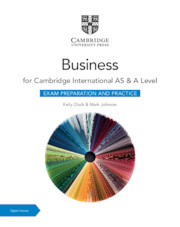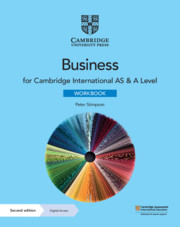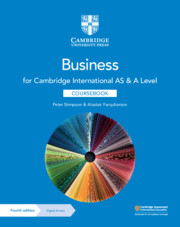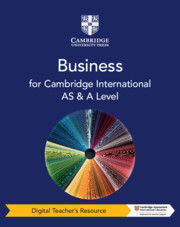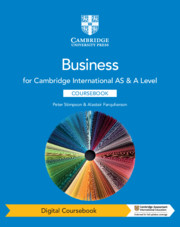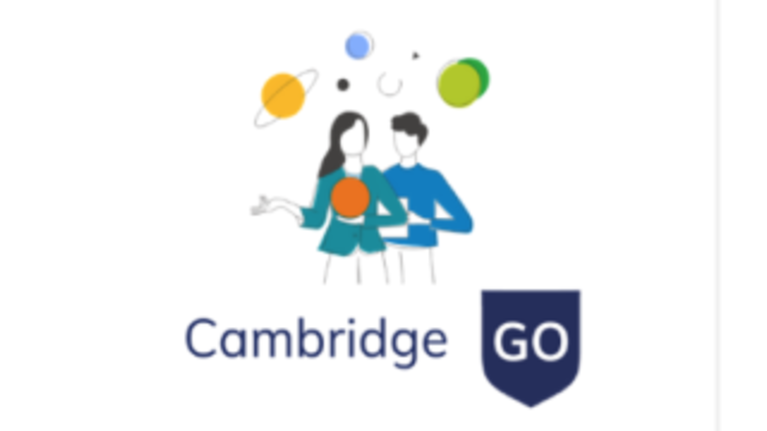Designed to increase your confidence, help you recognise different question types, understand connections between concepts, reflect on progress and manage test anxiety. A wealth of questions and activities improve your ability to recall knowledge and answer effectively. Your awareness and familiarity with exam language is increased by the focus on command words, time management, and the marks breakdown within and across exam papers. Self-assessment checklists and sample answers also help to deepen learning. Includes over 400 auto-marked questions and past-paper question practice. All other answers available via Cambridge GO. This text has not been through the endorsement process for the Cambridge Pathway. Any references or materials related to answers, grades, papers or examinations are based on the opinion of the author(s). The Cambridge International Education syllabus or curriculum framework associated assessment guidance material and specimen papers should always be referred to for definitive guidance.
Features
- A variety of case studies put theory into real-life contexts and give you the opportunity to apply your knowledge and skills.
- Build useful exam skills through active learning and focusing on questions rather than content summaries.
- Recognise effective learning techniques to become a critical thinker and apply your knowledge beyond the exam.
- Learn key command words, the variety of question types, how your time should be distributed throughout the exam paper, and how the marks breakdown within and across exam papers.
- ‘Reflection on progress’ opportunities and self-assessment checklists help you to process your own learning.
- ‘Knowledge recall’ questions help you consolidate your learning.
- Learn to recognise connections between concepts and present these connections clearly. The past paper question practice sections give you opportunities to draw your knowledge of several topics together.
- Accessibility Information: The accessibility information of this publication is unknown.
Table of Contents
- Contents
- How to use this book
- How to use this series
- Exam skills framework
- Introduction
- Unit 1 Business and its environment
- 1. Enterprise (AS level)
- 2. Business structure (AS level)
- 3. Size of business (AS level)
- 4. Business objectives (AS level)
- 5. Stakeholders in a business (AS level)
- 6. External influences on business activity (A level)
- 7. External economic influences on business activity (A level)
- 8. Business strategy (A level)
- 9. Corporate planning and implementation (A level)
- Unit 2 Human resource management
- 10. Human resource management (AS level)
- 11. Motivation (AS level)
- 12. Management (AS level)
- 13. Organisational structure (A level)
- 14. Business communication (A level)
- 15. Leadership (A level)
- 16. Human resource management strategy (A level)
- Unit 3 Marketing
- 17. The nature of marketing (AS level)
- 18. Market research (AS level)
- 19. The marketing mix – product and price (AS level)
- 20. The marketing mix – promotion and place (AS level)
- 21. Marketing analysis (A level)
- 22. Marketing strategy (A level)
- Unit 4 Operations management
- 23. The nature of operations (AS level)
- 24. Inventory management (AS level)
- 25. Capacity utilisation and outsourcing (AS level)
- 26. Location and scale (A level)
- 27. Quality management (A level)
- 28. Operations strategy (A level)
- Unit 5 Finance and accounting
- 29. Business finance (AS level)
- 30. Forecasting and managing cash flows (AS level)
- 31. Costs (AS level)
- 32. Budgets (AS level)
- 33. Financial statements (A level)
- 34. Analysis of published accounts (A level)
- 35. Investment appraisal (A level)
- 36. Finance and accounting strategy (A level).
Advice on useful tools
Advice on useful tools, activities and timetabling from teachers experiencing school closures.
Cambridge GO
All our supporting resources have now moved to Cambridge GO – the new home for your Cambridge digital content.
Listen to our podcast
Listen to our podcast to discover teaching inspiration & advice from leading educational thinkers.

